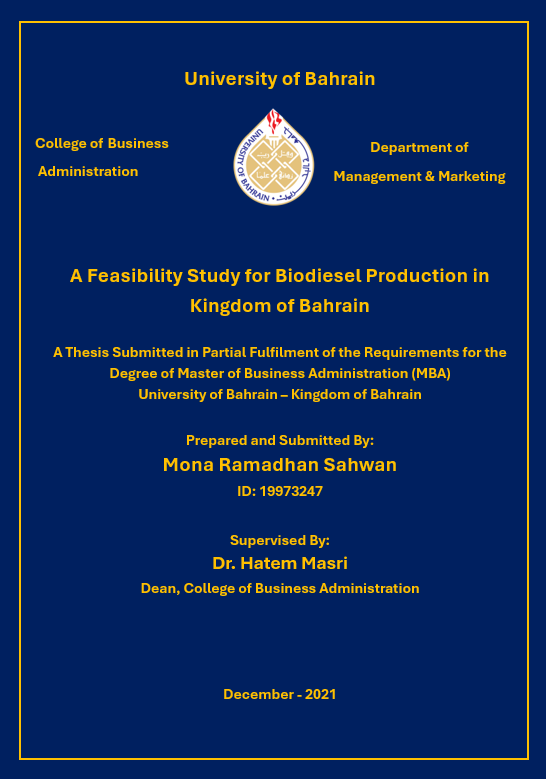المعرف
https://digitalrepository.uob.edu.bh/id/577704b8-f0f9-4cab-a5ab-ee60dbd8889e
A Feasibility Study for Biodiesel Production in Kingdom of Bahrain
وكيل مرتبط
Masri, Hatem , مشرف الرسالة العلمية
تاريخ النشر
2021
اللغة
الأنجليزية
مدى
[1], 11, 58 pages
مكان المؤسسة
Sakhir, Bahrain
نوع الرسالة الجامعية
Thesis (Master)
الجهه المانحه
UNIVERSITY OF BAHRAIN, College of Business administration, Department of Management & Marketing
الملخص الإنجليزي
Biodiesel also known as fatty acid methyl ester (FAME), obtained from the transesterification of the vegetable oil i.e., from palm oil, sunflower oil etc. They can also be produced from transesterification of used cooking oil (UCO). FAME is considered a renewable fuel and can be used as an alternative fuel to the existing conventional diesel or fossil diesel obtained from crude oil. Finding an alternate to existing crude based fuel is important to minimise the carbon footprint. Similarly, the necessity for biodiesel production in Kingdom of Bahrain is also to minimize the waste by increasing the waste recycle and utilizing them more wisely. This also helps minimizing the carbon footprint in general, improving sustainability as well as minimizing the impact of our existence on the climate change. In view of the above, the technical and commercial feasibility of the biodiesel in Kingdom of Bahrain is done on a plant, which produces 350 tones/month biodiesel using UCO as main feed. The expected market size for biodiesel in the Kingdom could be as high as approximately 110,000 liters per day, if it is to substitute 10% of the conventional (fossil) diesel utilization by 2025. Currently there is no market for FAME in Bahrain and Government policies are required to promote and enforced for the introduction, use and growth of the biodiesel market in the Kingdom. These policies or laws could take the form of reinforcement, government purchasing power to subsidize biodiesel, or obligatory blending legislation. The capital investment to produce 350 tones/month biodiesel production is approximately BD400,000 (machinery only). The working capital for 3 months is approximately BD215,000. From the cost it can be seen that installment cost is not a major contributor to produce the FAME, if Govt could provide the land. However, the raw material contributes to about 96% of the total manufacturing cost while depreciation and wages are the second biggest contributor towards the total production cost. Therefore, feed prices and product prices will make a difference to make it lucrative to produce. Therefore, a sensitivity analyses is also presented to compare the manufacturing costs of a biodiesel, which is very susceptible to changes in the UCO and methanol prices. In conclusion, the major cost towards production of biodiesel is raw material, any variation in raw material prices will affect the biodiesel manufacturing cost. Second most important aspect in biodiesel feasibility is the glycerol price, which is currently quite low. The glycerol is a byproduct from the FAME production. However, if glycerol purity could be increased this will at higher price and will help reducing the overall production cost of the biodiesel, which could make it more economical to produce and sell. Crude glycerol prices are currently low due to low purity and a global oversupply due to increased biodiesel production worldwide.
Keywords: Biodiesel, Used Cooking Oil (UCO), Methanol, Production, Fossil Diesel, Glycerol.
المجموعة
قالب العنصر
أطروحات

